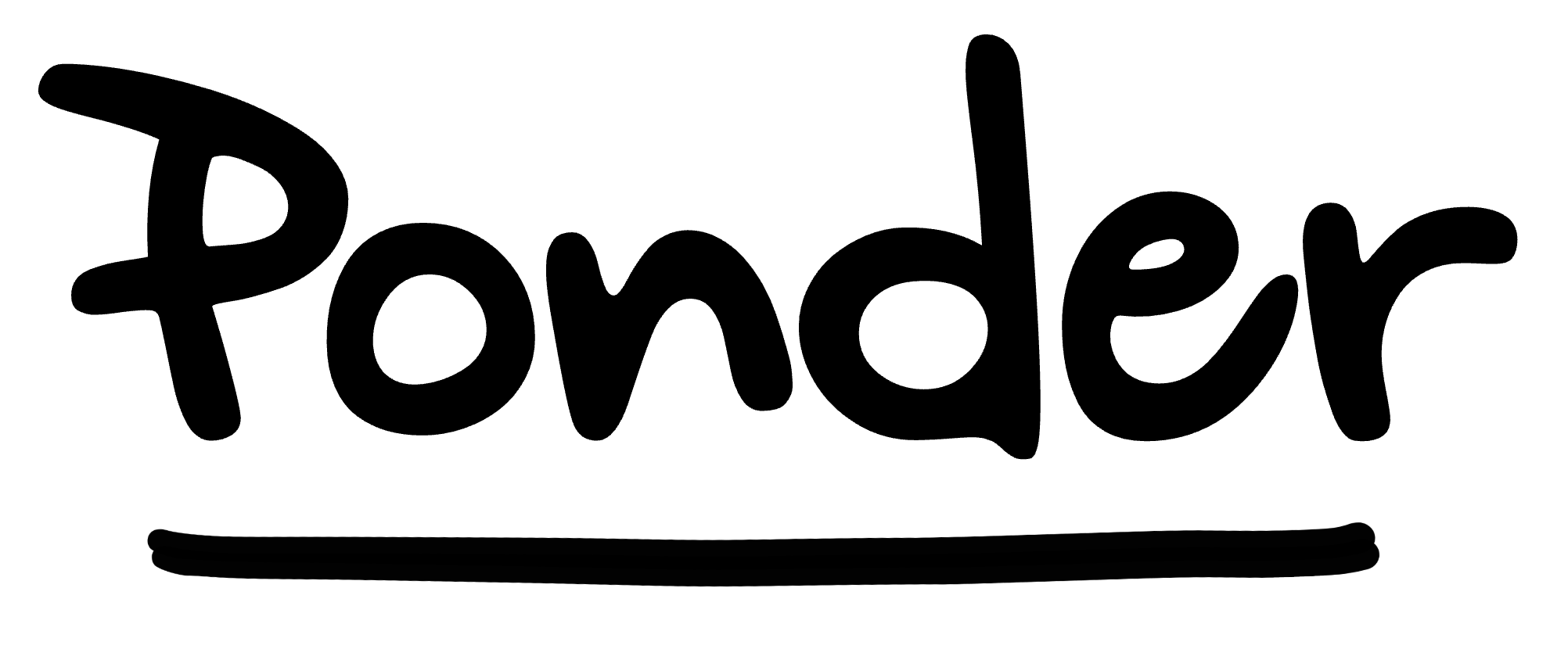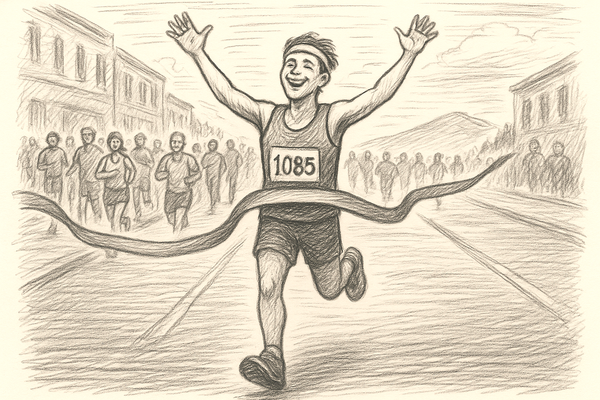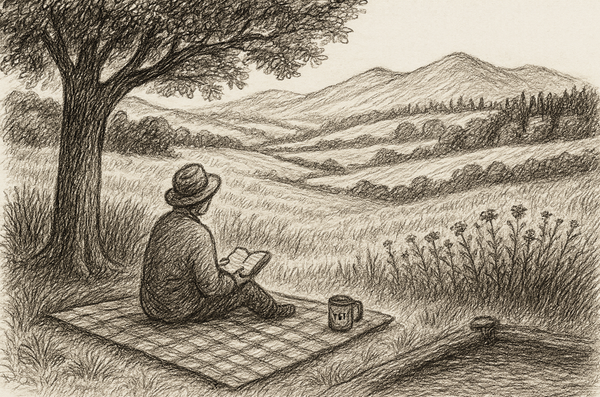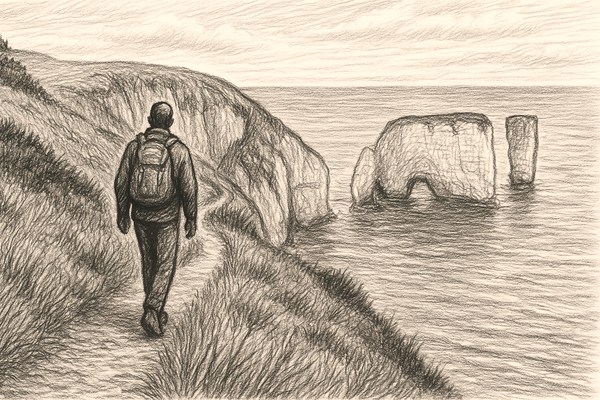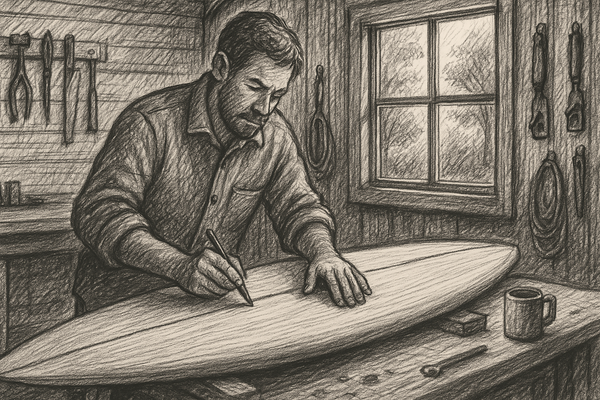The age of disconnection: why switching off is becoming aspirational

A few months ago I booked a short break in a cabin on the edge of a forest.
When I arrived, the host asked me to put my phone in a wooden box by the door. It felt uncomfortable at first, like stepping into a world without oxygen. But by the second evening, something shifted. I found myself sitting on the porch with a coffee, watching the light fade through the trees. I realised I had not thought about my inbox all day. Instead of scrolling, I had read, walked and let my mind wander.
That weekend left me more rested than any long-haul holiday I have taken.
Experiences like this are part of a bigger movement. We live in a world that is always on. Phones buzz with endless alerts, inboxes refill overnight, and social platforms tempt us back into the scroll. Attention is no longer something we can take for granted. It has become the scarcest resource.
The result is a cultural exhaustion that many of us feel but rarely name: burnout, distraction, and the uneasy sense that life is slipping by in a blur of notifications.
Against this backdrop, switching off has become aspirational. Being unreachable is not about fear of missing out anymore. It is about creating space for presence. And in this context, the rise of digital detox is not just a niche wellness movement. It is becoming a cultural shift. For brands, this shift is also a business opportunity.
The rise of attention as a cultural issue
Technology has given us enormous power. We can work from anywhere, connect with anyone, and access endless streams of information. Yet the very convenience that once felt like progress has tipped into compulsion.
A study from RescueTime in 2024 showed the average person checks their phone more than 150 times a day. Many of those checks are not intentional. They are habits built around small dopamine hits.
The pandemic deepened this. We relied on screens to connect, to work, and to be entertained. But when restrictions lifted, many found themselves craving simplicity. Walks in the woods, camping trips, paper journals, vinyl records. A desire to touch, to feel, to slow down. Digital fatigue had sparked a hunger for analog experiences.
For businesses, this marks a turning point. Just as sustainability reshaped consumer expectations in the past decade, the next wave of differentiation may come from how brands help people reclaim focus.
Unplugged: absence as product
One of the clearest examples of this new approach is Unplugged, founded by Hector Hughes and Ben Elliott. Their cabins are scattered across the UK, designed as three-day escapes. Guests arrive, place their phones in a locked box, and are encouraged to live offline.
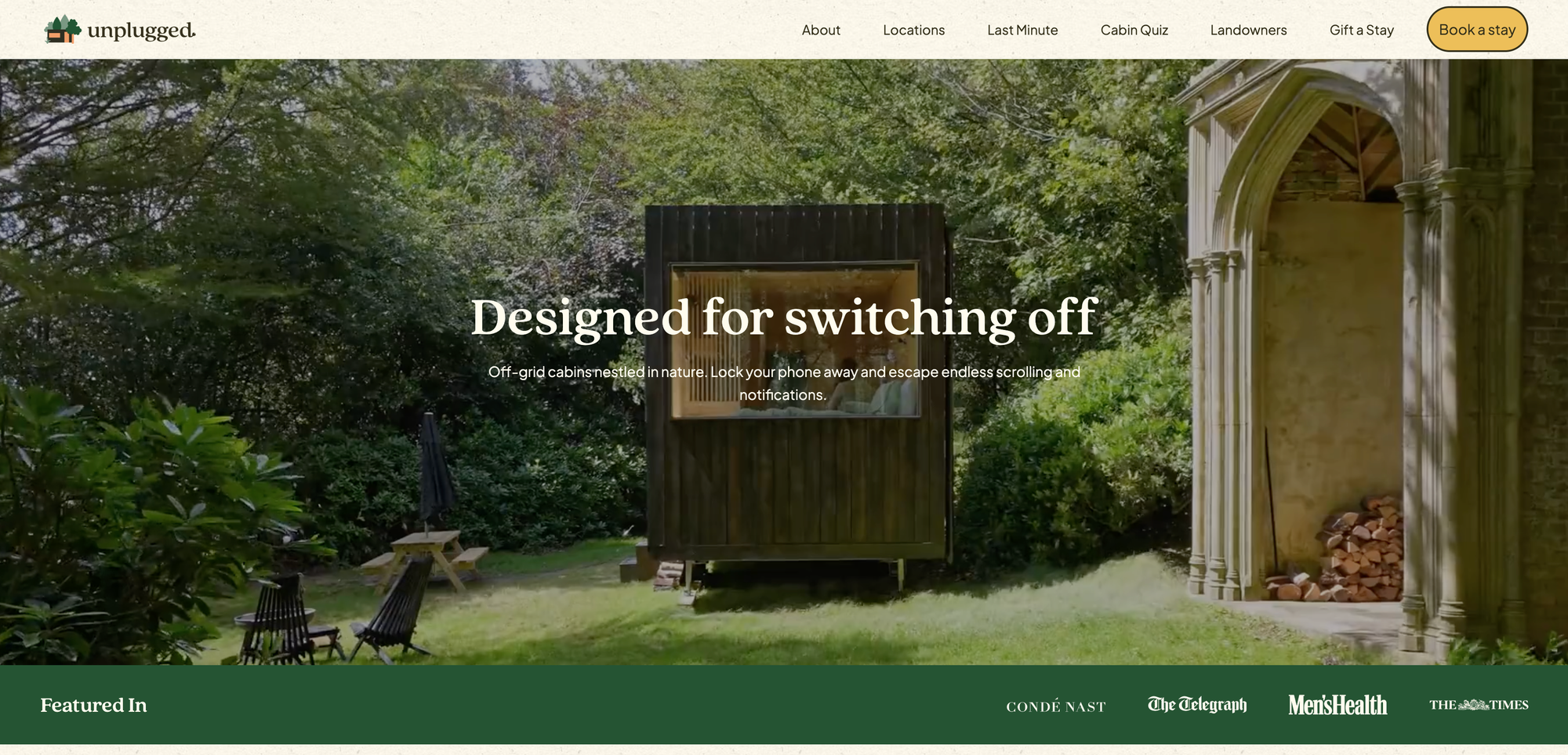
The idea came from Hughes’ own burnout. After leaving a high-growth tech role, he travelled to a silent monastery in the Himalayas. The experience of enforced disconnection changed him. When he returned to London, he and Elliott built Unplugged to share that experience with others.
By framing absence as a luxury, Unplugged created a new category. Their cabins are not marketed as punishment for screen overuse. They are framed as restorative, premium experiences where the reward is silence.
Unyoked: designing stillness into place
Unyoked has built its brand around cabins that feel more like sanctuaries than rentals. Each space is set deep in nature and stripped back to the essentials.
There is no wifi, no television, and no attempt to fill every moment with activity. Instead you find wide windows framing forest or mountain views, simple interiors that invite calm, and outdoor decks that encourage lingering with a book or a drink by the firepit.
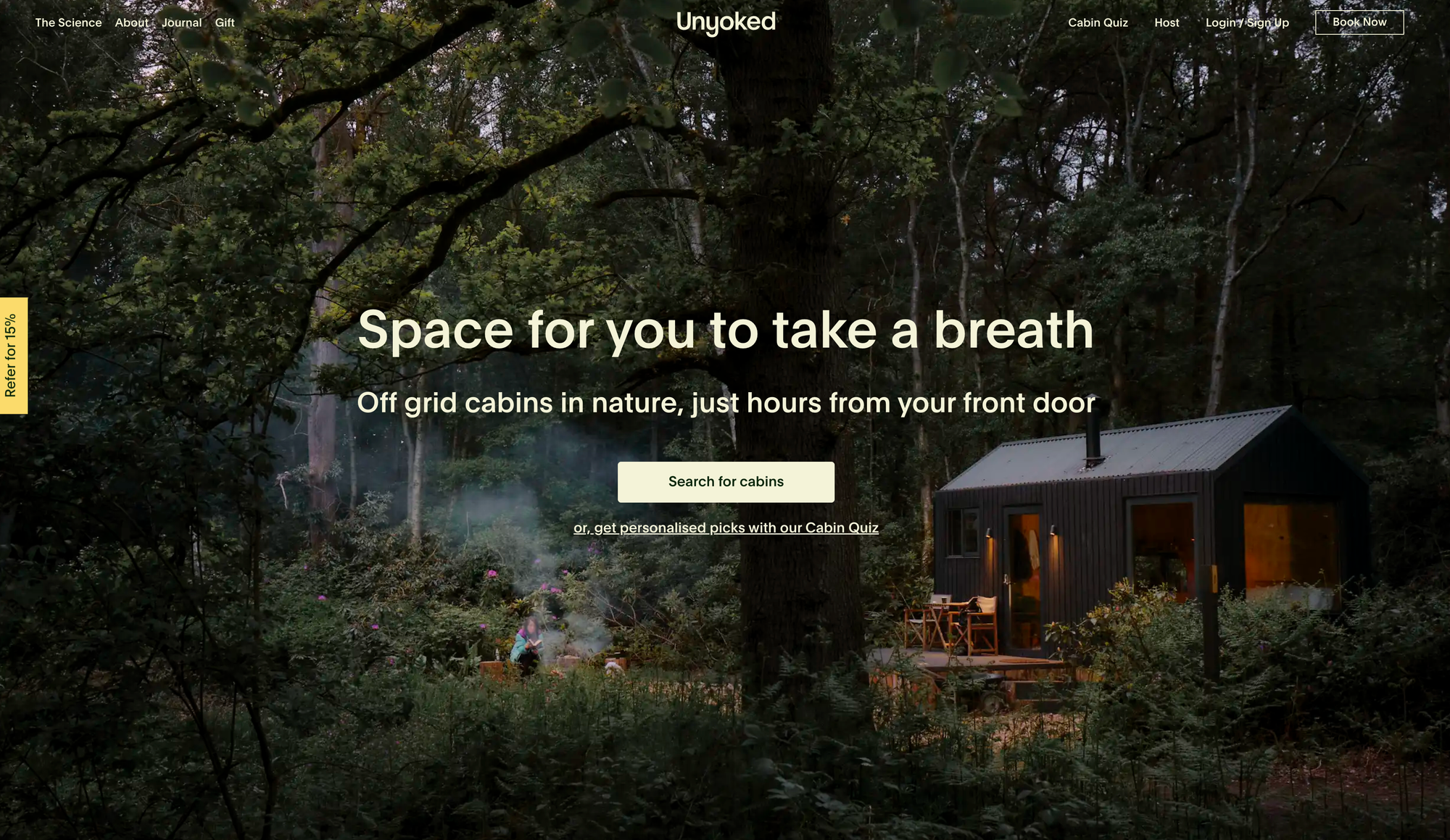
What makes Unyoked distinctive is not what they add, but what they choose to leave out. By removing distraction, they create the conditions for presence. In a culture overloaded with noise and choice, that subtraction becomes the product.
Other pioneers
Unplugged and Yolk are not alone. Across hospitality and lifestyle, other players are experimenting with ways to weave disconnection into experiences.
- Cabinspace and Kip Hideaways curate stays that are remote and pared back, selling silence, simplicity and space instead of amenities.
- Finisterre, founded by cold-water surfer Tom Kay, has long connected outdoor gear to mental clarity and elemental living.
- Patagonia, still shaped by Yvon Chouinard’s ethos, has redefined what an outdoor company can be, from its “Don’t Buy This Jacket” campaign to the Worn Wear programme.
Each of these brands reflects a growing appetite for fewer distractions and deeper connection.
Everyday culture follows
This movement is not limited to outdoor escapes. It is bleeding into everyday culture. The resurgence of vinyl, Polaroid cameras and printed magazines signals a desire for ritual and tactility. Stationery companies like Ugmonk have built followings around analog productivity tools such as their Analog card system, offering an alternative to digital task apps.
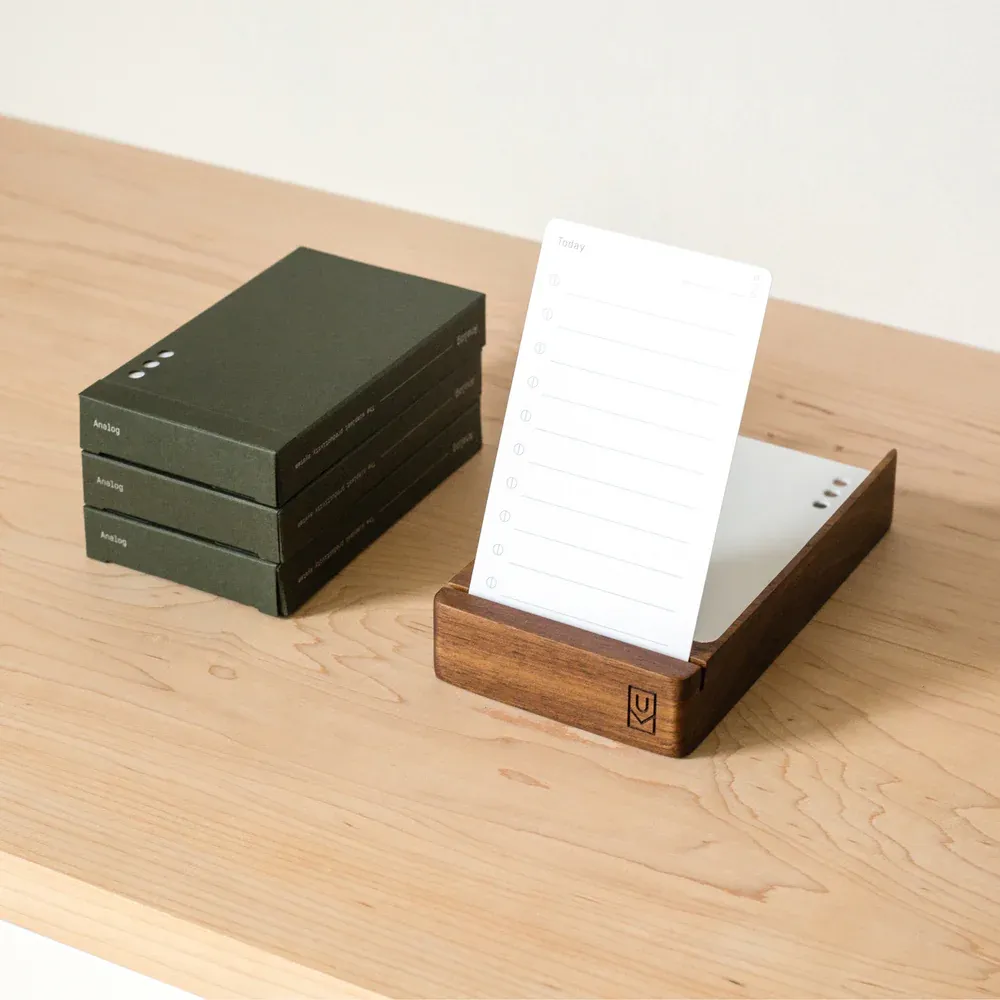
Even apps themselves are being repurposed to support detox. Tools like AppBlock, Freedom and Forest let people block access to social platforms or grow virtual trees by staying offline. What unites them is the recognition that willpower alone is often not enough. People want systems that make absence easier.
I use AppBlock myself to geo-fence my home and restrict apps when I am there. At first it was frustrating. I would still check my phone, only to find the apps blocked. But over time my brain learned. That reflex checking faded.
Now when I sit still or get bored, I no longer reach for the screen because I know it will not deliver that dopamine hit. That small change has created a bigger sense of calm.
The founder factor
What gives these brands credibility is not just design, but the authenticity of their founders. Hughes of Unplugged lived the burnout. Tom Kay of Finisterre grew up immersed in cold water surf culture. Chouinard at Patagonia began as a climber and blacksmith, creating tools for himself before he built a company.
Authenticity matters because digital detox is personal. Consumers quickly sense tokenism. The most successful brands are those led by people who embody the lifestyle they promote. They are not just marketing an idea. They are living it.
Lessons for brands
For brands outside of cabins and clothing, the question is how to translate this shift.
- Design for absence. Could your product create moments of stillness, silence or focus? A café could introduce phone-free hours. An event could run without wifi.
- Elevate ritual over convenience. Hand-ground coffee, long walks, handwritten notes. Experiences that slow people down are increasingly valued.
- Use founder stories as strategy. Lived experience of distraction or burnout can be powerful if told honestly.
- Be bold about subtraction. The most distinctive brands are the ones willing to sell less, not more. They resist the temptation to add noise.
Looking ahead: the opportunity of disconnection
The future of digital detox will stretch beyond retreats and outdoor gear.
Workplaces, schools and even cities are beginning to rethink how they design environments for attention. Some companies are already trialling “deep work days” where meetings and chat tools are banned, giving employees uninterrupted time to focus.
Universities are setting up phone-free study zones, while city planners are experimenting with quiet urban spaces designed for pause rather than consumption.
Technology itself is bending towards this demand. Phone manufacturers are adding modes that encourage disconnection, while social platforms are under growing pressure to set healthier defaults.
The shift may not be instant, but it feels inevitable. Just as organic became an expectation in food and sustainability became an expectation in fashion, disconnection could soon become an expectation across daily life.
Consumers are already paying for cabins without wifi, apps that block notifications, and products that restore presence. In the years ahead, this approach will not be optional. It will be expected. The brands that embrace it will stand out. Because in a world that never stops, helping people pause will be one of the most valuable things a company can offer.
The real question is not whether disconnection matters. It is whether brands are brave enough to make absence part of their strategy. Because in a culture addicted to more, the companies that help people embrace less will be the ones that feel most relevant.
